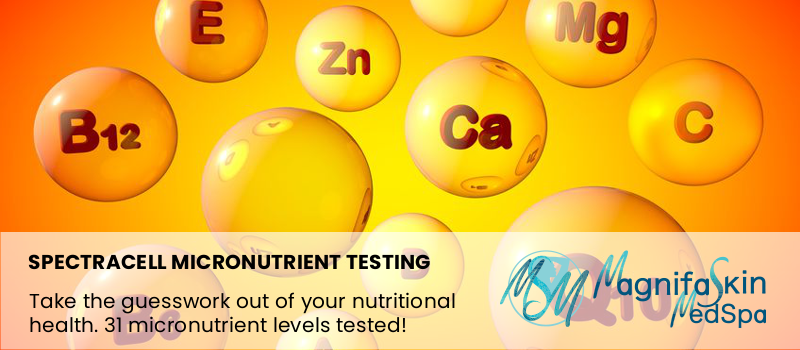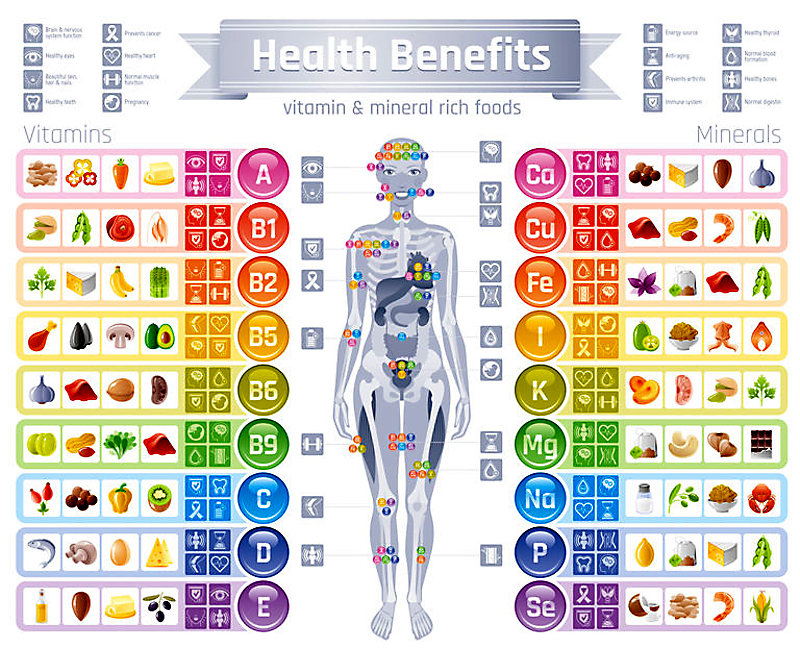Spectracell Micronutrient Testing
The Science of Rejuvenation


Be the first to know about new Specials, and blog posts with valuable free information on skin care, beauty and wellness. Sign up below and you'll receive an email notice of new specials as well as new posts. You can unsubscribe at any time.

At MagnifaSkin we’re not just about beauty. We care about your health as well. This is why we offer such treatments as Hydration and Vitamin Therapy, Microcurrent Therapy and Red and Blue Light Therapies. We’re very excited to now offer SpectraCell Micronutrient Testing.

The nutrient requirements of our bodies are very complex. Too little or too much of a long list of essential nutrients can result in serious health issues. Even if you eat a healthy diet, you may be surprised by the results.
What is SpectraCell Micronutrient Testing?
Most of us have had blood tests, and your doctor may have told you that you are deficient in iron or B vitamins. This is excellent information to know, as nutrient deficiencies can cause a host of health problems. Unfortunately, standard blood tests only target a few nutrients and so can leave us with a very incomplete picture of our nutrient levels. SpectraCell Micronutrient Testing fills in the gaps left by the standard blood tests ordered by your doctor, and can give us some very important information that will lead to diet and supplement changes which can vastly improve our energy levels, strengthen our immune system, alleviate symptoms of arthritis, reduce our risk of developing Alzheimers, and even improve memory, focus and cognition.

Sample report data, courtesy of Spectracell
SpectraCell Micronutrient Testing measures 31 vitamins, minerals, amino/fatty acids, antioxidants, and metabolites. The results from this testing will tell you if you’re deficient in any of these nutrients so you can take the needed steps to avoid the health issues that can result.
In addition, to make matters even more complicated, many essential nutrients are toxic if we have too much, and cause severe health problems as a result. So if you think that SpectraCell Micronutrient Testing is only for people with an unhealthy diet, think again. If you’re eating a healthy diet and supplementing with multi-vitamins or other forms of nutrient supplements, you might be at risk of having toxically high levels of some of these nutrients.
For example, many women are iron deficient. But did you know that if you are also copper deficient, the copper deficiency will prevent your body from absorbing iron? This means you might be taking iron supplements, or making an effort to get extra iron in your diet, but you’ll still be iron deficient because you don’t have enough copper.
Essential Nutrients
Here is a partial list of the nutrients we test for with SpectraCell Micronutrient Testing, and the effects on your body of having too little, or too much.
Vitamin A
Vision, Skin Health
We all know it’s good for our vision, but vitamin A plays an important role in other things too. If you haven’t heard of retinol, it’s a variant of vitamin A and essential for skin health. Low levels of vitamin A may cause our skin to age more quickly, and be more susceptible to damage from the sun. In addition, it’s also very important for pregnant women to have sufficient amounts of vitamin A. Deficiency can result in night blindness and, even more seriously, an increased risk of dying from pregnancy or during childbirth.
Vitamin D
Bone Health
We get it from milk, foods such as fatty fish, cheese, and egg yolks, and from exposure to sunlight. Despite this, it’s estimated that over 40% of us may be vitamin D deficient. Vitamin D helps to regulate calcium and phosphate in our body, two elements which are essential for bone health. In children, vitamin D deficiency can cause rickets, a disease which results in bone deformations. Adults too can suffer from a condition called osteomalacia, which manifests as literally bone-deep aches and pains. If you’re sore all the time, you might be vitamin D deficient.
Vitamin E
Immune Function, Skin Health
Most of us don’t need to worry about this one, as vitamin E, like vitamin C, is stored in our body for long periods of time. However, being deficient in vitamin E can have serious repercussions. It can inhibit our immune system, making us more susceptible to disease, infections, and even cancer. It will also cause our skin to age faster.
Vitamin C
Tired Skin, Fatigue, Rapid Aging, Cancer
We’ve all heard of scurvy, the disease of sailors in past centuries that resulted from vitamin C deficiency. It takes time to develop, as our body can store vitamin C for months. However, when it runs out, serious issues result. While most of us today don’t need to worry about this, if you know that your diet is less than ideal, it is possible that might be deficient in vitamin C.
Symptoms include muscle and joint pain, being tired all the time, red dots on your skin, and bleeding and swelling of the gums. Long before these symptoms develop, though, there will be a detrimental effect on our skin. Collagen can’t be replaced without vitamin C, so our skin will look saggy and tired.
Vitamin C is also an antioxidant, helping to slow the aging process and keep us young on the inside. It’s also been shown to lower our risk of cardiovascular diseases and some cancers.
So, even though it’s unlikely that you are vitamin C deficient, the consequences of a deficiency are dire. Best to know for sure.
Thiamin (Vitamin B1)
Fatigue
Feeling tired all the time? You might be thiamin deficient. While an extreme lack of thiamin is unlikely and causes a disease called beriberi, even mild thiamin deficiency can lead to chronic weakness and fatigue. This is because thiamin helps the body’s cells convert glucose into energy.
If you drink more than you should, you are at high risk of thiamin deficiency, as alcohol blocks absorption of this important nutrient.
Riboflavin (Vitamin B2)
Fatigue, Skin Health, Vision, Nervous System
This is another one where a deficiency may manifest as a lack of energy. In addition, riboflavin is important for the health of our skin, eyes and nervous system. While extreme riboflavin deficiency is unlikely, the consequences can be severe. Symptoms may include a sore throat, cheilosis (lesions on the lips), angular stomatitis (lesions on the angles of the mouth), glossitis (fissured and magenta-colored tongue), corneal vascularisation (very visible red veins in the whites of the eyes), dyssebacia (red, scaly, greasy patches on the nose, eyelids, scrotum, and labia), and anemia.
Niacin (Vitamin B3)
Liver Disease
While we’re concerned about deficiencies with most nutrients, an excess of niacin can be very dangerous. If you’re eating a healthy diet and taking a multi-vitamin or B-complex vitamin you might have too much niacin. This can eventually cause liver damage, so it’s very important to be sure you’re not overdosing.
Folate and Folic Acid
Cell Growth, Healthy Babies
If you’ve ever been pregnant there’s a good chance your doctor prescribed Folic Acid. While Folic Acid and Folate are very similar (they are both forms of Vitamin B9) there are some essential differences that are important to understand. In short, Folate is the naturally occurring form of B9, while Folic Acid is artificial. While many artificial supplements are indistinguishable chemically from their naturally occurring counterparts, not so with Folic Acid.
Folic Acid is often prescribed for pregnant women because it is essential for cell growth and the formation of DNA. Taking Folic Acid while pregnant has been proven to reduce the risk of birth defects and just generally leads to healthier babies. However, Folic Acid is very slow to be absorbed by the body and turned into 5-MTHF, the active form of this nutrient.
While you should absolutely follow your doctor’s recommendation if you are prescribed Folic Acid during pregnancy, at all other times natural sources are best for maintaining Folate levels. The best sources are green, leafy vegetables, so dig into those salads.
Vitamin B12
Fatigue, Sleep Disorders, Depression, Poor Memory
One of the most important of all nutrients, a lack of B12 will lead to pernicious anemia, a lack of red blood cells. B12 is essential for our body to produce these cells, and as our body is continually replacing dying red cells, a lack of B12 for any period of time can cause serious problems.
Symptoms include extreme tiredness, lack of energy, pins and needles (paraesthesia), sore and red tongue, muscle weakness, depression, and problems with memory, understanding, and judgment.
Biotin
Weight Control
Struggling with your weight? While biotin deficiency is rare as our body only requires very tiny amounts, it is essential for the metabolism of fat. If you lack biotin, your body can’t properly break fat down for energy.
Calcium
Healthy Bones and Teeth, Muscle Contraction, Depression, Kidney Stones
We’re sure you’re not surprised to find this one on the list of highly important nutrients. We all know that calcium is important for our bones and teeth. In addition, calcium is necessary for muscle contraction and even a short-term deficiency can cause muscle cramps, stiffness, and poor mobility. For these reasons, it’s not just essential for children to have enough calcium. Adults over 50 should also be very aware of the need for this element.
On the other hand, if you’re eating a healthy diet and taking calcium supplements you may be in danger of calcium toxicity, which can be just as bad. Symptoms include fatigue, depression, muscle weakness, kidney stones, constipation, and spondylitis (rigidity and inflammation of the spine).
Magnesium
Healthy Bones and Teeth, Brain Function
This nutrient helps with energy production in the body and is essential for proper functioning of your parathyroid glands. These glands produce hormones that help to keep our bones strong, so even if you have enough calcium a lack of magnesium can still lead to brittle bones and osteoporosis. In addition, recent research indicates that magnesium is very important for optimizing brain function, mental focus and memory.
As with many other nutrients, though, too much magnesium can be dangerous. Short term high doses of magnesium can cause diarrhea, nausea, vomiting and stomach cramps. Long term overdosing can cause drops in blood pressure, slowing down of the heartbeat or erratic beating, or cardiac arrest. It can also cause muscle weakness and difficulty breathing, confusion, lethargy, lack of balance, or even coma and death.
Copper
Anemia, Iron Deficiency
As mentioned in the introduction, copper is essential in the production of both red and white blood cells. Women are especially susceptible to iron deficiency but many women who take iron supplements are still not getting enough iron due to a shortage of copper. Without copper, it doesn’t matter how much iron your body has, it still won’t produce enough hemoglobin. This will result in a lack of oxygen to your entire body.
Selenium
Immune System, Reproduction, Anti-Aging
Never heard of it, right? The most exposure many of us have ever had to this very essential nutrient is seeing it on a multi-vitamin label, but selenium is one of the most important trace elements. Not only does it play a vital role in our immune system and reproduction, but it’s a powerful antioxidant. A lack of selenium can result in the tissues of our body, including our skin, aging much faster than they otherwise would.
Fructose
Obesity, Non-Alcoholic Fatty Liver Disease
That’s fruit sugar, right? Yes, but as you’ll discover in an upcoming guest post by diet and fitness blogger Will Dove, fructose is what’s called a ‘threshold toxin’. Fructose is one-half of table sugar, high fructose corn syrup, and many other sweeteners. Not only are most of us taking in far too much fructose, but the severe detrimental health effects of fructose can be amplified if you are fructose sensitive. This is a very important thing to know, as fructose toxicity leads to Non-Alcoholic Fatty Liver Disease, which causes a host of severe health problems. If you’re fructose sensitive you’ll need to be even more diligent than most in avoiding over-consumption. And considering that the safe recommended daily intake for the average person is only 3 – 4 teaspoons per day, being sensitive means that avoiding toxic levels of fructose is a real challenge.
Achieving Optimum Balance
This is just a partial list of the micronutrients that we test for with SpectraCell Micronutrient Testing. We are all different. Body chemistry can vary widely from one individual to another. This means that even with a healthy diet, we could have too little or too much of some essential nutrients. Once tested, changes to diet, the addition (or reduction) of some supplements, and B12 injections or Hydration Therapy, can correct these issues and bring your body's nutrients into optimum balance.
Spectracell Micronutrient Testing: 31 Micronutrients
Vitamins
|
Minerals
Amino Acids
Fatty Acids
|
Antioxidants
Carbohydrate Metabolism
|
Metabolites
SPECTROX™for Total Antioxidant Function IMMUNIDEX™Immune Response Score |

